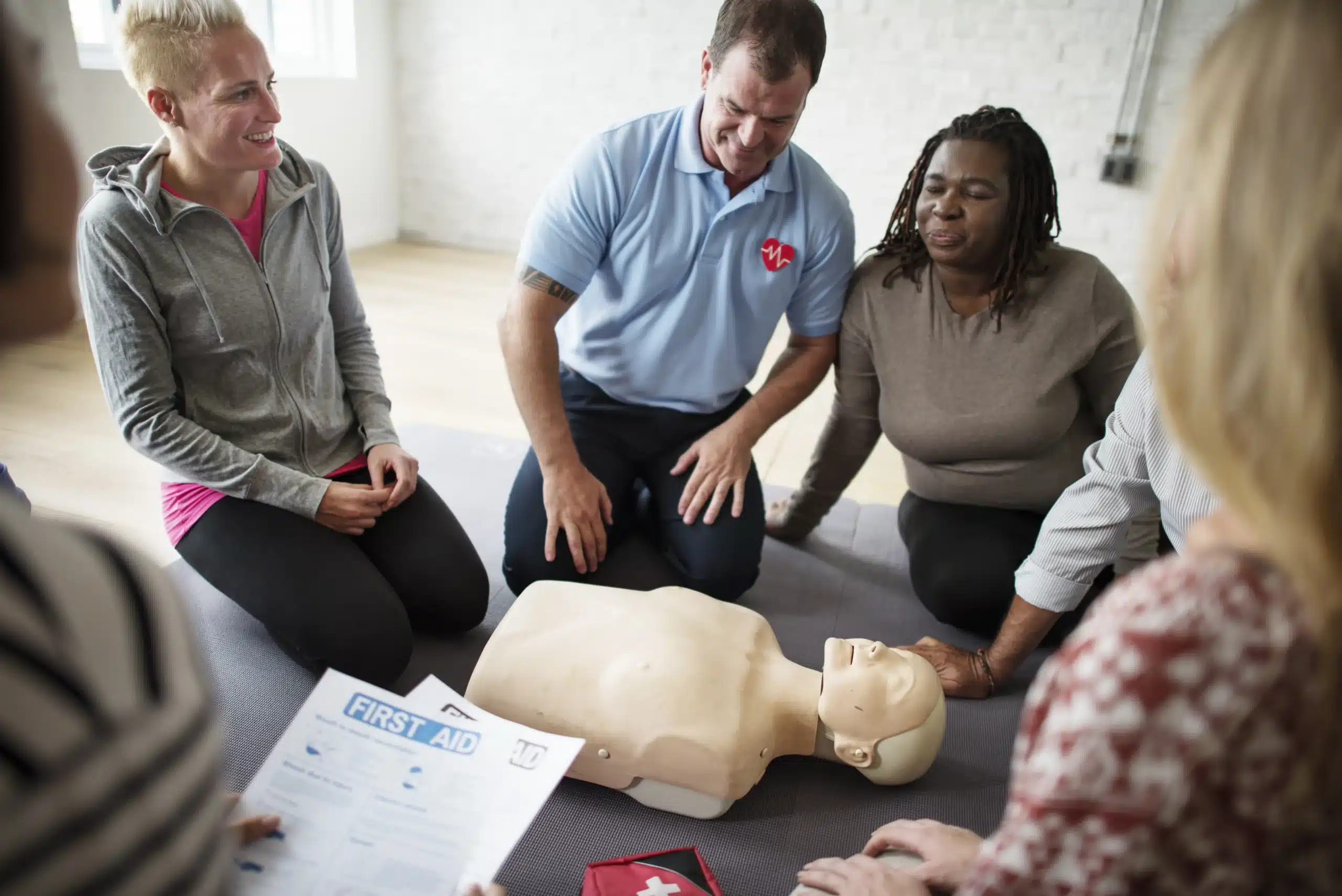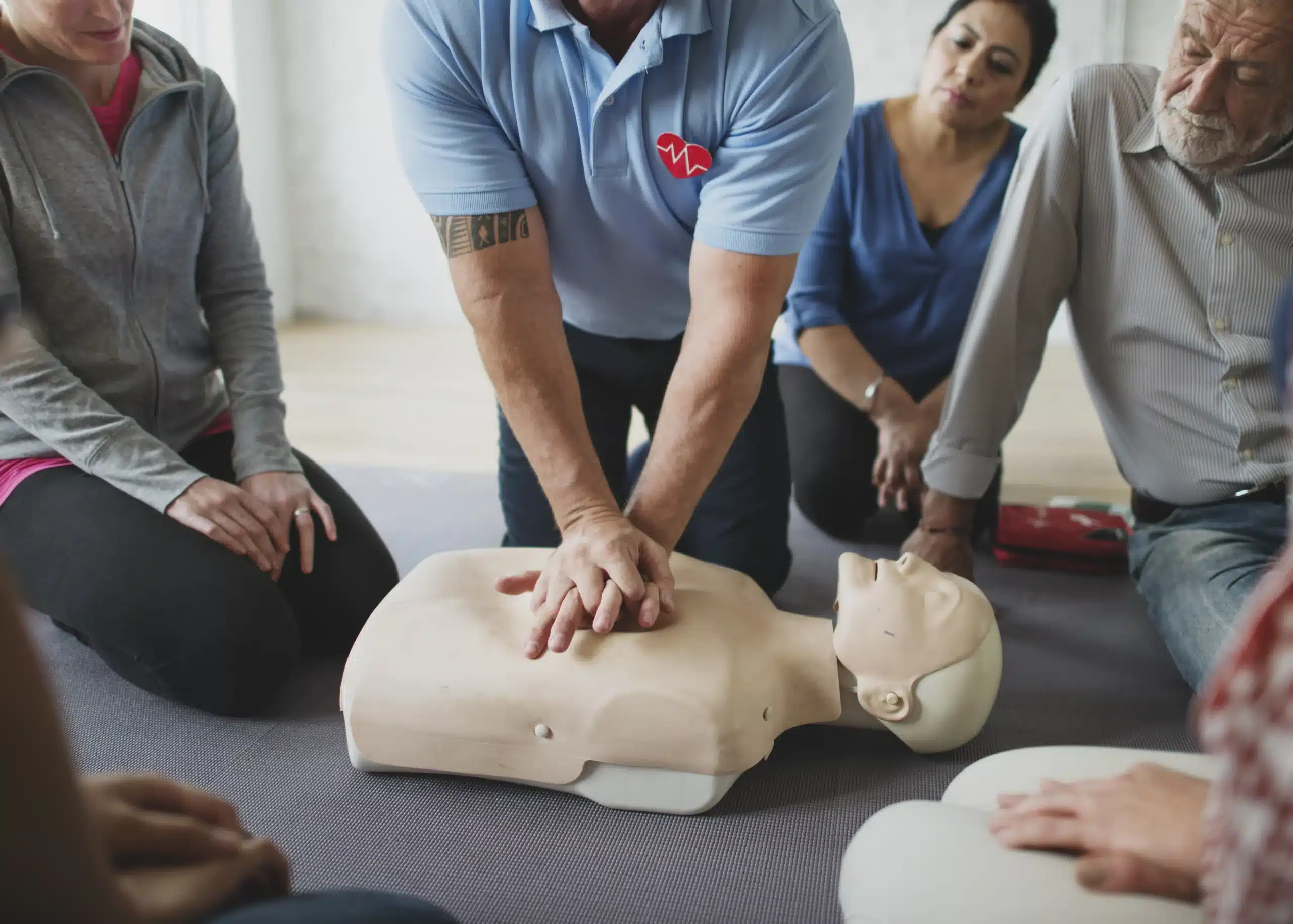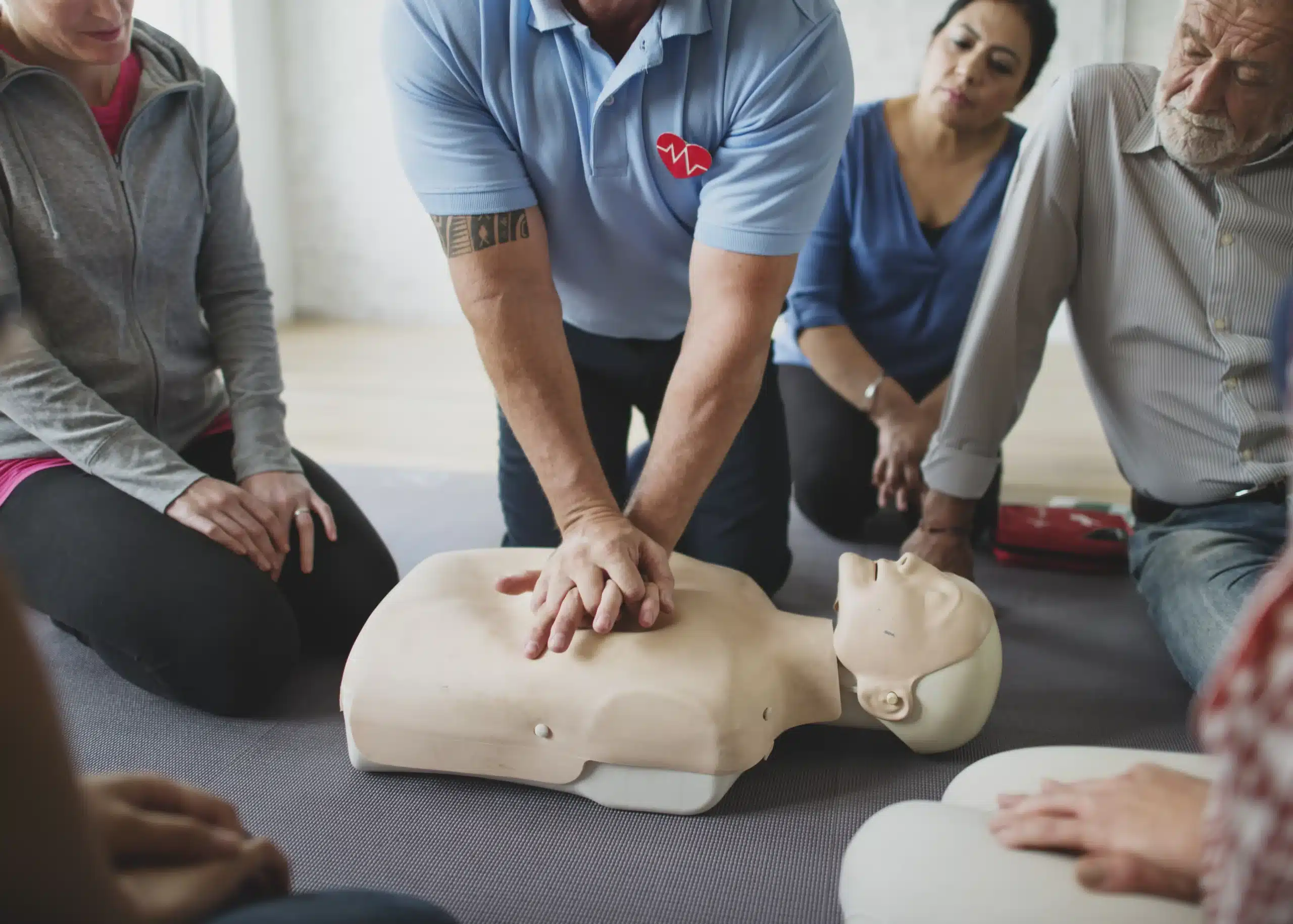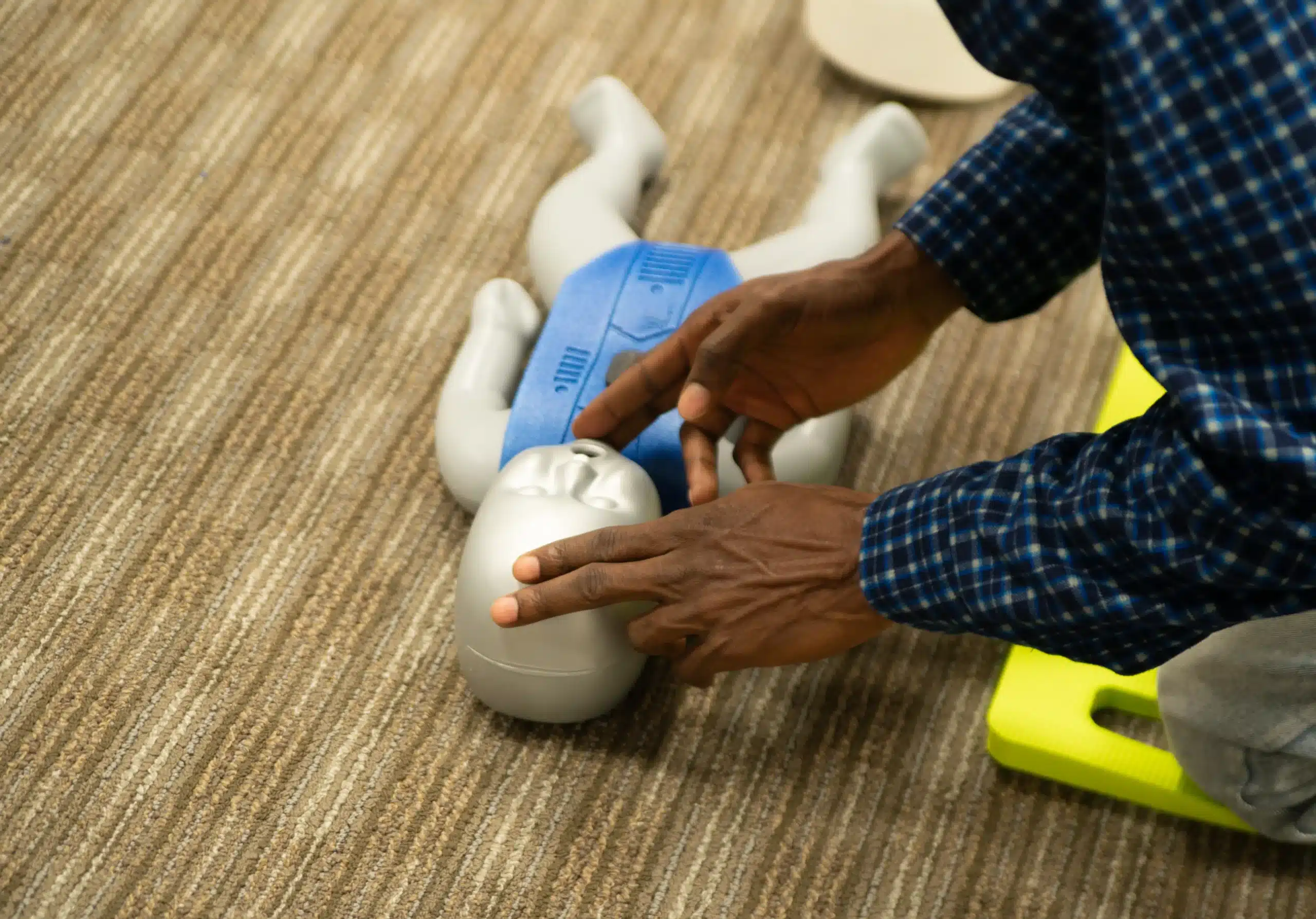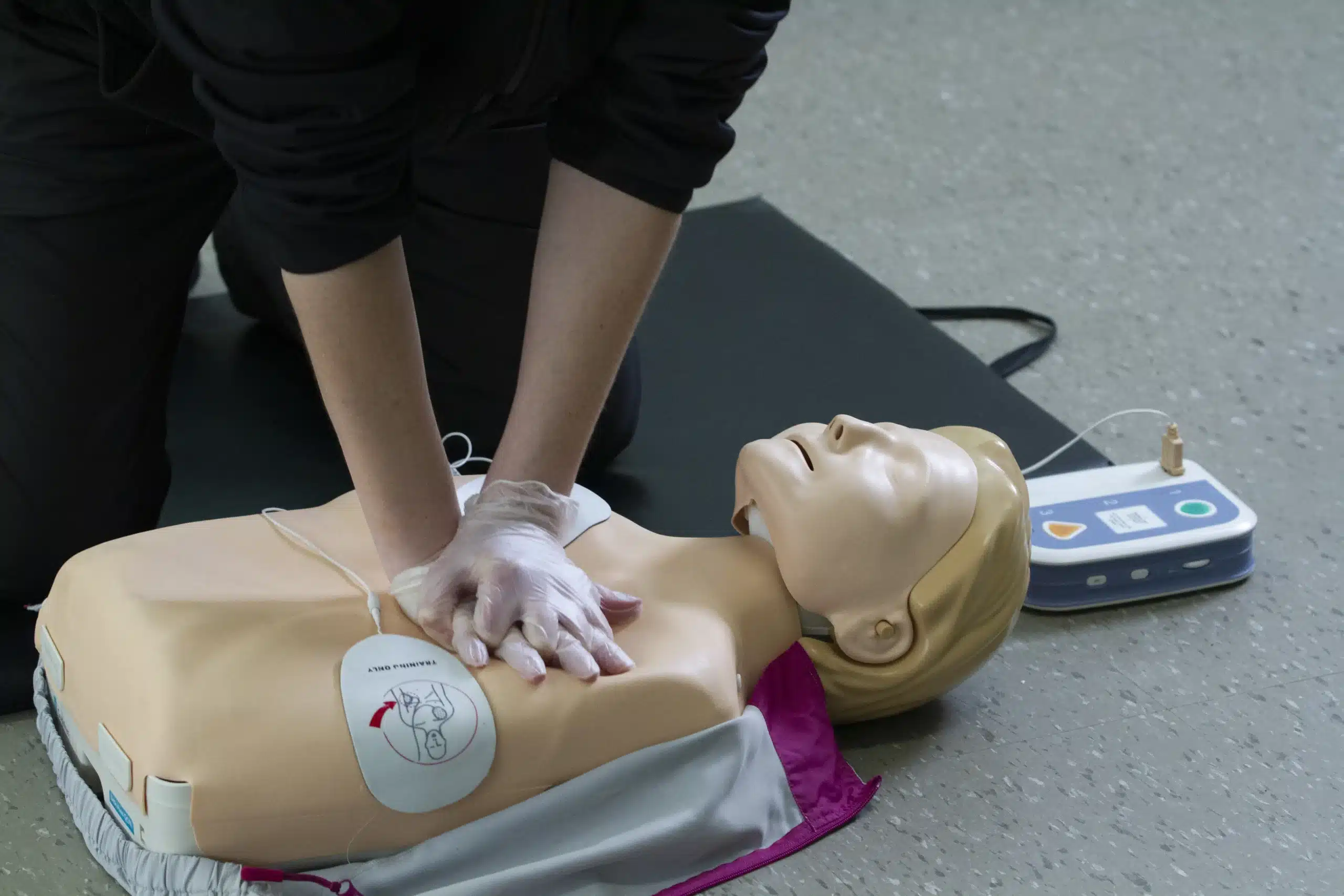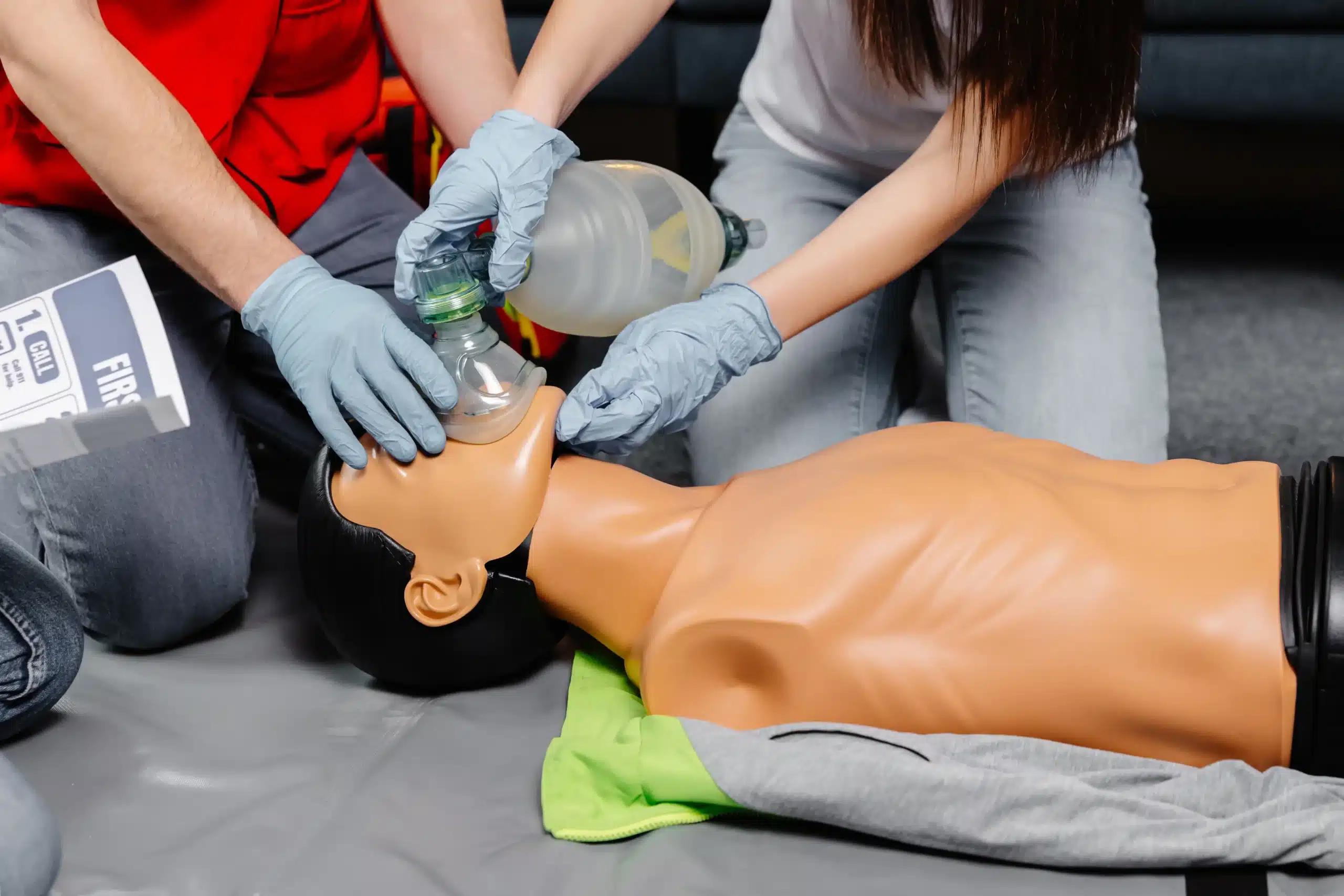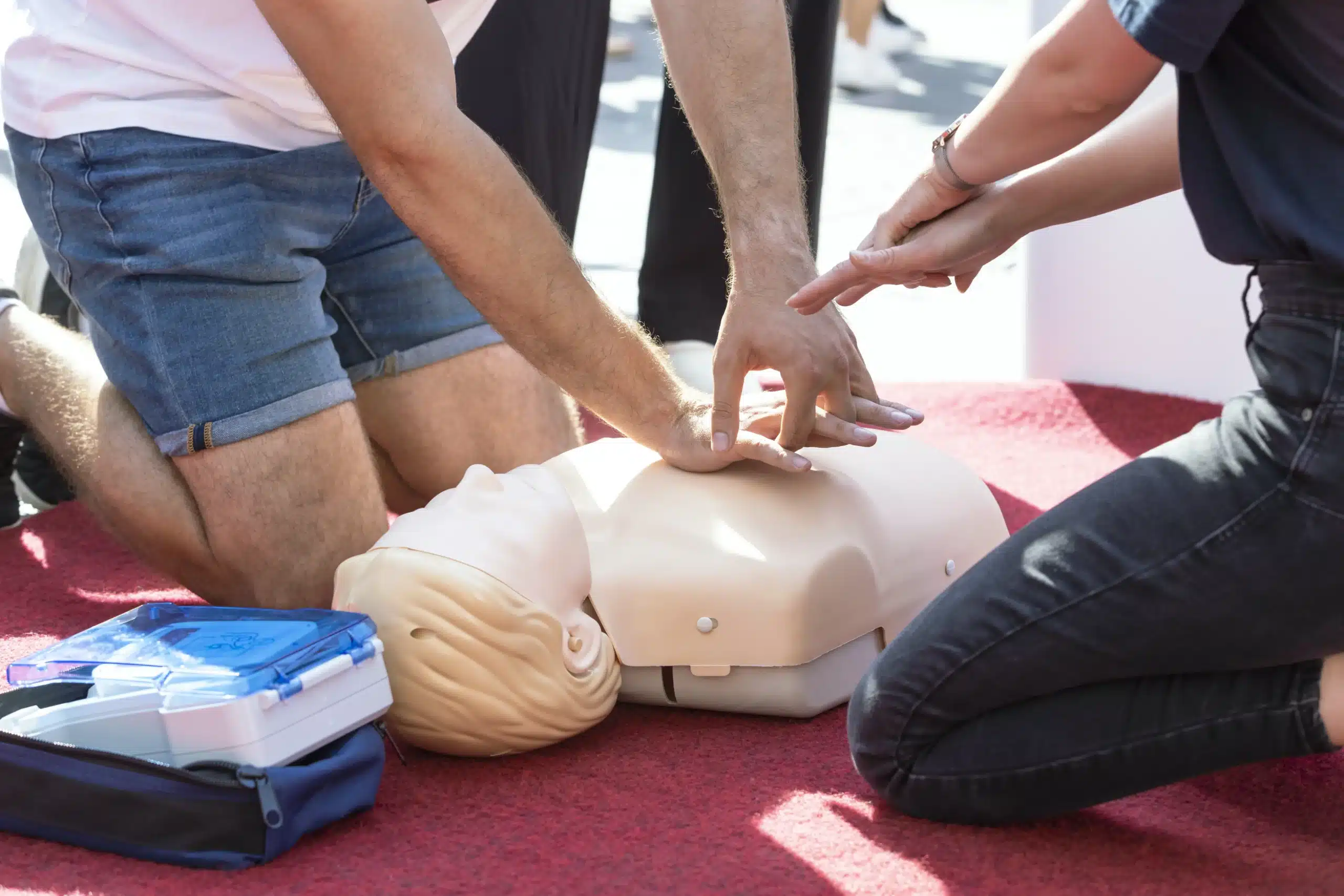Working in healthcare, you know how quickly skills can fade without regular practice. CPR is no exception. RQI in Cupertino offers a solution to this challenge with its innovative, data-driven approach to CPR training. This article will explore how RQI in Cupertino helps healthcare providers stay at the top of their game with short, frequent training sessions that fit easily into even the busiest schedules. We’ll discuss the advantages of RQI over traditional CPR courses, the technology behind its real-time feedback system, and how it’s making a difference in the quality of CPR delivered in Cupertino.
Key Takeaways
- RQI improves CPR skills and confidence: Frequent, short training sessions reinforce essential techniques and build confidence for real-world emergencies.
- RQI training fits your schedule: The flexible, blended learning format combines online learning with brief in-person skills sessions, making certification maintenance easier.
- RQI provides ongoing support and feedback: Real-time feedback during practice and access to ongoing resources ensure providers stay sharp and up-to-date with the latest guidelines.
What is RQI? Revolutionizing CPR Training in Cupertino
RQI, or Resuscitation Quality Improvement, represents a significant advancement in CPR training for healthcare providers in Cupertino and beyond. Unlike traditional CPR classes, which typically involve infrequent, lengthy sessions, RQI takes a different approach. It emphasizes short, frequent training sessions to help healthcare professionals maintain their CPR skills and knowledge at a consistently high level. This innovative program ensures that providers are always ready to deliver effective CPR during cardiac emergencies, ultimately leading to better patient outcomes. RQI follows the latest American Heart Association (AHA) guidelines, so you can be confident you’re learning the most up-to-date techniques. Learn more about the RQI program offered at Campbell CPR Classes.
The Data-Driven Approach
RQI uses a data-driven approach to track and measure CPR competence. Through regular practice and real-time feedback, providers can identify areas for improvement and refine their skills. This personalized approach ensures that training is targeted and effective, leading to higher levels of CPR proficiency. This focus on quality improvement helps build confidence and ensures that healthcare professionals are well-prepared for real-life emergencies.
Low-Dose, High-Frequency Training
One of the key benefits of RQI is its low-dose, high-frequency training model. Instead of cramming all your training into one long session every two years, RQI provides quarterly training sessions that easily fit into busy schedules. These shorter, more frequent sessions make it easier for healthcare providers in Cupertino to stay up-to-date on their CPR skills without disrupting their workflow. This approach has been shown to improve CPR competence and retention compared to traditional methods. If you’re looking for training options for your team, contact us about our discounted group classes. We offer the lowest prices in Santa Clara County.
What is RQI and Why is it Important for Healthcare Providers?
RQI, or Resuscitation Quality Improvement, represents a significant advancement in CPR training for healthcare professionals. Unlike traditional CPR courses, RQI focuses on consistent practice and skill maintenance, ensuring providers are always ready to deliver high-quality CPR in critical situations. This approach strengthens individual skills and contributes to better patient outcomes. For healthcare providers in fast-paced environments, maintaining these life-saving skills is paramount, and RQI offers a practical and effective solution.
The Data-Driven Approach
RQI is a data-driven program designed to elevate the quality of CPR. It uses innovative technology to track performance, identify areas for improvement, and provide personalized feedback. This evidence-based approach ensures training aligns with the latest American Heart Association (AHA) guidelines. Studies show that the RQI model increases provider confidence and improves CPR performance, leading to more effective compressions and ventilations. This data-driven focus helps providers achieve and maintain high-quality CPR, ultimately benefiting patient care.
Low-Dose, High-Frequency Training
One of RQI’s key advantages is its low-dose, high-frequency training model. Instead of infrequent, lengthy training sessions, RQI incorporates short, regular practice sessions into a provider’s routine. This flexible approach makes it easier to fit training into busy schedules while reinforcing crucial skills. Think of it like regular workouts for your CPR skills, keeping them sharp and ready for action. These shorter, more frequent sessions cover the same cognitive and skills modules as traditional CPR programs but are spread out to ensure consistent competency and high-quality performance over time.
RQI Courses in Cupertino
RQI courses offer a modern approach to CPR training, focusing on high-quality skills and regular practice. Whether you need BLS, ACLS, or PALS certification, RQI provides a flexible and effective way to stay up-to-date. Campbell CPR Classes offers these essential RQI courses in Cupertino, ensuring healthcare providers in the area have access to this innovative training.
BLS for Healthcare Providers
The BLS for Healthcare Providers RQI course covers the fundamental skills needed to respond to cardiopulmonary emergencies in a healthcare setting. This course combines online learning modules with short, frequent in-person skills sessions. This blended learning approach allows you to learn at your own pace and refresh your skills regularly, leading to improved retention and confidence in real-world scenarios. The emphasis on high-quality CPR techniques ensures you’re prepared to deliver the best possible care to your patients. Learn more about our BLS RQI course.
ACLS
The ACLS RQI course builds upon the foundation of BLS, providing advanced life support training for healthcare professionals. This course focuses on the systematic approach to resuscitation, covering topics such as airway management, rhythm recognition, and pharmacology. Like the BLS RQI course, ACLS RQI utilizes a blended learning format, allowing for flexible scheduling and ongoing skill maintenance. Regular practice through RQI helps healthcare providers maintain proficiency in these critical skills, leading to better patient outcomes. Contact us to learn more about our ACLS courses.
PALS
The PALS RQI course is designed for healthcare providers who care for infants and children. This course covers the specialized skills and knowledge needed to respond to pediatric emergencies. PALS RQI emphasizes a team-based approach to resuscitation, focusing on effective communication and coordinated care. The blended learning format and regular skills sessions ensure that healthcare providers maintain the competence and confidence to provide high-quality care in these critical situations. For more information on our PALS courses, visit our website.
RQI vs. Traditional CPR Training: A Comparison
So, how does Resuscitation Quality Improvement (RQI) stack up against traditional CPR training? Let’s break down the key differences:
Effectiveness and Skill Retention
Traditional CPR training often involves longer, less frequent classes, typically every two years. While this approach covers the essentials, studies show that skills can deteriorate quickly. RQI’s low-dose, high-frequency training combats this with short, quarterly practice sessions. This consistent reinforcement helps healthcare providers maintain muscle memory and improve CPR quality, leading to better patient outcomes. The increased practice also builds confidence, empowering providers to act decisively in emergencies. Studies show improvements in both compression and ventilation skills among healthcare professionals using the RQI model.
Convenience and Flexibility
Juggling a busy schedule? RQI offers a flexible, blended learning approach that combines online modules with short, hands-on skills sessions. This allows you to complete the cognitive portion at your own pace, fitting it seamlessly into your workday or personal time. The brief, in-person skills sessions are also designed for convenience, minimizing disruption to your workflow. This adaptable approach makes maintaining certification much easier than traditional methods, which often require dedicating larger blocks of time.
Real-Time Assessment and Feedback
One of RQI’s standout features is its use of real-time feedback. During skills sessions at the RQI Simulation Station, you’ll receive immediate, personalized feedback on your performance. This helps you identify areas for improvement and refine your technique, ensuring you’re delivering high-quality CPR. Traditional CPR courses often rely on instructor observation, which may not be as precise or immediate. RQI’s technology-driven approach provides a more objective and effective way to hone your skills.
Impact on Patient Outcomes
Ultimately, the goal of any CPR training is to improve patient survival rates. By emphasizing consistent practice and skill maintenance, RQI aims to equip healthcare providers with the skills they need to deliver effective CPR in real-world emergencies. The ongoing training and assessment provided by RQI contribute to higher quality CPR performance, which can directly impact patient outcomes. The American Heart Association considers their resuscitation education the “gold standard,” and RQI builds upon this foundation to further enhance the quality of CPR delivery.
The RQI Experience: What to Expect
So, you’re considering RQI training? Great! This section walks you through what to expect during your training and beyond, giving you a clear picture of the process, from the initial modules to the ongoing support.
Training Process and Technology
RQI takes a different approach than traditional CPR classes. Instead of one long training session every two years, you’ll engage in shorter, more frequent sessions. This “low-dose, high-frequency” method reinforces your skills and keeps them fresh—like regular workouts for your CPR skills. These shorter sessions make it easier to fit the training into your busy schedule. You’ll use the RQI Simulation Station, which provides real-time feedback on your compressions and breaths, ensuring you’re performing CPR correctly. The program combines self-directed learning with hands-on skills sessions for a blended learning experience. You’ll also find adaptive eLearning modules that adjust to your individual learning pace. This personalized approach helps you master the material effectively. The program covers the same cognitive and skills modules as a traditional CPR training program but delivers them quarterly rather than every two years, ensuring your resuscitation skills remain sharp.
Ongoing Support and Resources
One of the best things about RQI is the ongoing support. You’re not on your own after the initial training. The program provides continuous assessment and feedback to help you maintain your CPR skills and knowledge. This ongoing reinforcement is key to improving survival rates from cardiac arrest. You’ll have access to resources and support materials to stay up-to-date on the latest AHA guidelines. This commitment to ongoing education ensures you’re always prepared to provide high-quality care. RQI offers a comprehensive approach to CPR training, focusing on skill maintenance and continuous improvement. It empowers healthcare providers with the knowledge and confidence to perform CPR effectively in any situation. If you’re looking for a more engaging and effective way to maintain your CPR certification, RQI might be the perfect fit. Contact us at Campbell CPR Classes to learn more about our RQI courses. We offer a variety of options to fit your needs and schedule. We’re here to support you on your journey to becoming a more confident and skilled CPR provider.
Benefits of RQI for Cupertino Healthcare Professionals
RQI training offers significant advantages for healthcare professionals in Cupertino, enhancing their skills, confidence, and overall patient care. Let’s explore some key benefits:
Increased CPR Confidence
Confidence in performing CPR is crucial for any healthcare provider. The RQI program helps build this confidence by focusing on consistent skill maintenance and knowledge reinforcement. Through frequent, low-dose training sessions, providers gain proficiency and become more comfortable delivering high-quality CPR. Studies show that the RQI model improves both compression and ventilation skills, leading to a noticeable decrease in the number of attempts needed to achieve effective CPR. This boost in proficiency naturally translates to increased confidence in real-world emergency situations. Knowing you have the skills readily available can make all the difference when every second counts. This AHA program flyer details some of the program benefits.
Improved Emergency Performance
Beyond confidence, RQI directly impacts the quality of CPR delivered in emergencies. The program’s emphasis on high-quality CPR training through regular practice and real-time feedback creates a foundation for improved performance. RQI utilizes simulation-based mastery learning, allowing providers to hone their skills in a controlled environment and develop muscle memory. This consistent reinforcement of best practices, through low-dose, high-frequency sessions, leads to better patient outcomes. By maintaining a high level of CPR competency, healthcare professionals are better equipped to respond effectively and improve the chances of survival for those experiencing cardiac arrest.
Convenient Certification Maintenance
Maintaining CPR certification is a requirement for most healthcare professionals, and RQI offers a streamlined and convenient approach. The program’s flexible, blended learning format combines online modules with short, frequent skills sessions. This allows busy professionals to fit training seamlessly into their schedules, eliminating the need to block out large chunks of time for traditional renewal courses. RQI adapts to your lifestyle, making it easier to stay current with certifications and focus on providing excellent patient care. This convenient approach ensures that healthcare providers can maintain their skills without disrupting their workflow. The flexibility of RQI is particularly helpful for staff with varying certification requirements.
Implementing RQI in Cupertino Healthcare Facilities
RQI represents a significant shift in how healthcare organizations approach CPR training. This section explores the advantages of implementing RQI within Cupertino healthcare facilities and how it seamlessly integrates with existing training protocols.
Benefits for Healthcare Organizations
Integrating RQI into your Cupertino healthcare facility offers numerous benefits. The RQI program equips healthcare providers with the skills and knowledge to deliver effective CPR during cardiac arrest. By offering frequent, high-quality CPR training, RQI elevates the standard of care provided during these critical events, ultimately leading to improved patient outcomes. The program’s emphasis on low-dose, high-frequency training ensures that skills are consistently refreshed and maintained at a high level. This consistent reinforcement leads to increased confidence among healthcare professionals and a greater sense of preparedness in emergencies. This data-driven approach allows for precise measurement and tracking of CPR competence, providing valuable insights for continuous quality improvement. The subscription-based model ensures that healthcare providers always have access to the latest CPR guidelines and best practices, keeping your facility aligned with the highest standards of resuscitation care. For a deeper understanding of the RQI program structure, explore additional RQI resources.
Integration with Existing Training
One of RQI’s key strengths is its flexible design, which allows for seamless integration with existing training programs within your Cupertino healthcare facility. The blended learning format combines online modules with short, frequent skills sessions. This adaptable approach makes it easier to incorporate training into busy schedules without disrupting workflow. RQI complements traditional CPR training by providing continuous reinforcement of essential skills. The program’s focus on mastery learning, through simulation-based practice and real-time feedback, ensures that healthcare providers achieve and maintain proficiency in CPR techniques. This approach reinforces existing training and provides a platform for ongoing skill development. Learn more about how RQI integrates with existing training protocols from resources like Morgan Hill CPR Classes and Laerdal Medical. By adopting RQI, Cupertino healthcare facilities can create a culture of continuous learning and improvement in resuscitation care, ultimately benefiting both healthcare providers and the community.
RQI Training Costs in Cupertino
RQI training offers a different pricing model than traditional CPR certification courses. Instead of a one-time fee for a two-year certification, RQI typically involves a subscription or recurring fee structure. This covers access to the online learning modules, skills practice sessions, and ongoing assessment and feedback. While this might seem like a continuous cost, it’s designed to provide consistent, high-quality training and ensure long-term proficiency. Think of it as an investment in maintaining crucial skills and improving patient outcomes.
Pricing Structure
RQI programs often partner with healthcare facilities to implement training and manage costs efficiently. These programs target facilities that want their staff to maintain proficiency and certification in BLS, ACLS, or both through routine, quarterly check-offs, rather than re-certifying every two years. This approach streamlines the training process and helps facilities budget predictably for CPR training. For individuals seeking RQI training, contacting local training centers like Campbell CPR Classes is the best way to get specific pricing information. We offer competitive rates and can help you understand the various RQI options available. RQI provides flexible CPR training that adapts to your schedule: the blended learning format combines online modules with short, frequent skills sessions.
Value for Healthcare Professionals
While there’s an ongoing cost associated with RQI, the value it provides to healthcare professionals is significant. The RQI program helps providers maintain their CPR skills and knowledge, critical for delivering effective CPR during cardiac arrest. Consistent reinforcement of skills and knowledge leads to increased confidence and improved performance in emergencies. This translates to better patient outcomes and potentially higher survival rates from cardiac arrest. Beyond the clinical benefits, RQI offers convenience and flexibility. The short, frequent skills sessions fit more easily into busy schedules than traditional, longer certification courses. This format reduces the stress of having to cram for recertification every two years. Ultimately, the investment in RQI training contributes to both individual professional development and improved patient care.
Where to Find RQI Training in Cupertino
Finding the right RQI training program is crucial for healthcare providers in Cupertino who want to stay up-to-date on the latest CPR techniques. Here are a few options to explore:
Campbell CPR Classes
Campbell CPR Classes offers a variety of American Heart Association certification courses, including RQI. Their convenient location serves San Jose, Campbell, and Cupertino, making it a great option for local healthcare professionals. They offer a blended learning format, combining online modules with short, frequent in-person skills sessions. This flexible approach makes it easier to fit training into a busy schedule. For those looking for cost-effective options, they also offer discount group classes. Check out their Low Price Guarantee for more information. You can also contact them directly to discuss your specific RQI needs.
Other Local Providers
While Campbell CPR Classes is a great option, it’s always good to explore other providers. You can find additional RQI training centers by searching online for “RQI training near me” or contacting the American Heart Association directly. Be sure to check if they offer the specific RQI certifications you need, such as BLS, ACLS, and PALS for healthcare providers. When comparing providers, consider factors like scheduling flexibility, program cost, and instructor experience.
Enroll in RQI Training
So, you’re ready to take the next step and improve your CPR skills with RQI training? This section will walk you through choosing the right program and preparing for your training.
Choose the Right RQI Program
The Resuscitation Quality Improvement (RQI) program, developed by the American Heart Association, offers quarterly training to help healthcare professionals master high-quality CPR skills. It’s designed specifically for healthcare providers and offers different certification levels based on your needs. Do you need a refresher on your Basic Life Support (BLS) skills? Or are you an Advanced Cardiovascular Life Support (ACLS) certified provider looking to maintain your certification? RQI has programs for both. Check with your employer to see which certification level is required for your role. You can also explore the RQI program options at Campbell CPR Classes.
One of the biggest advantages of RQI is its flexible training. The blended learning approach combines online modules with short, frequent skills sessions. This makes it easier to fit training into a busy schedule. You can complete the online portion at your own pace and then schedule a short hands-on skills session at a convenient time.
Prepare for Your RQI Training
RQI training uses a “low-dose, high-frequency” approach. This means you’ll participate in short, regular refresher sessions. These frequent, targeted practice sessions are more effective than cramming for a big test every two years. They help solidify your skills and build confidence. Think of it like regular workouts—short, consistent effort leads to long-term strength. The American Heart Association designed RQI with this principle in mind.
Another key element of RQI training is real-time feedback. During your hands-on skills sessions, you’ll use the RQI Simulation Station, which provides immediate audiovisual feedback on your CPR technique. This objective feedback helps you identify areas for improvement and refine your skills on the spot. This personalized approach ensures you’re performing CPR at the highest quality. You’ll leave your training session feeling confident and prepared.
Related Articles
- CPR & First Aid Training in Cupertino: Your Guide – Campbell CPR Classes
- CPR Certification in San Jose: Your Complete Guide – Campbell CPR Classes
- American Heart Association Training in Cupertino: Your Guide – Campbell CPR Classes
- BLS Certification in Cupertino: Your Complete Guide – Campbell CPR Classes
- Discounted CPR Classes in Santa Clara County – Campbell CPR Classes
Frequently Asked Questions
How does RQI differ from traditional CPR training?
RQI focuses on short, frequent skills sessions, typically quarterly, instead of one lengthy class every two years. This approach helps healthcare providers maintain their skills at a consistently high level, leading to improved competence and confidence in emergencies. It also incorporates real-time feedback and personalized learning, making it more effective than traditional methods.
What does the RQI training process involve?
RQI training combines online learning modules with short, hands-on skills sessions using the RQI Simulation Station. You’ll learn at your own pace online and then practice your skills in person with real-time feedback. This blended learning approach offers flexibility and personalized instruction.
Is RQI training more expensive than traditional CPR courses?
RQI typically uses a subscription or recurring fee structure, covering ongoing access to training materials, skills sessions, and feedback. While this differs from the one-time fee for traditional CPR courses, it ensures continuous skill development and access to the latest guidelines. Consider it an investment in maintaining essential, life-saving skills.
Where can I find RQI training in Cupertino?
Campbell CPR Classes offers RQI training in Cupertino, along with other AHA certification courses. You can also search online for “RQI training near me” or contact the American Heart Association directly to find other local providers. When choosing a provider, consider factors like location, scheduling flexibility, and program costs.
What are the benefits of RQI for healthcare professionals?
RQI helps healthcare providers build confidence in their CPR skills through consistent practice and personalized feedback. This leads to improved performance in emergencies and better patient outcomes. The flexible training format also makes it easier to maintain certification and stay up-to-date on the latest guidelines.


